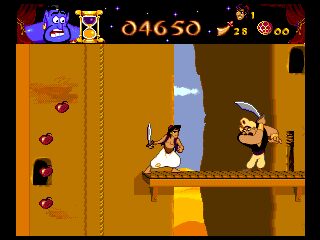Disney movie tie-in games have evolved dramatically since the early 1990s, transforming from simple promotional products into legitimate interactive entertainment that captures the magic and storytelling of their source material. Early attempts like Capcom's The Little Mermaid for NES established the foundation for Disney gaming, offering colorful platforming action that translated Ariel's underwater adventures into playable form, though with mixed results in terms of gameplay depth and technical execution.
The genre reached new heights when Virgin Interactive secured the Disney license and revolutionized movie adaptations with a trilogy of exceptional 16-bit platformers. Virgin's Disney's Aladdin for Genesis (also ported to Amiga and many other platforms) became the gold standard for Disney games, featuring fluid animation created by Disney's own animators, tight platforming mechanics, and faithful recreation of the film's most memorable sequences. The success continued with The Lion King, which combined stunning visuals with challenging gameplay that perfectly captured Simba's journey from cub to king across varied African landscapes.
Disney's The Jungle Book completed Virgin's Disney trilogy, offering more accessible gameplay while maintaining the high animation quality and cinematic presentation that defined the series. These Virgin titles proved that licensed games could be both commercially successful and critically acclaimed when developed with genuine care and substantial resources.
Later entries like Eurocom's Disney's Tarzan and Disney's Hercules maintained Disney's gaming legacy during the 32-bit era, bringing enhanced graphics and expanded gameplay mechanics to new generations of players. Tarzan particularly impressed with its innovative vine-swinging mechanics and lush jungle environments, while Hercules offered satisfying action-adventure gameplay that honored the film's mythological themes.
These Disney adaptations demonstrated that movie tie-in games could transcend their promotional origins to become memorable gaming experiences that stand alongside their cinematic inspirations, establishing templates for licensed game development that developers still reference today.








